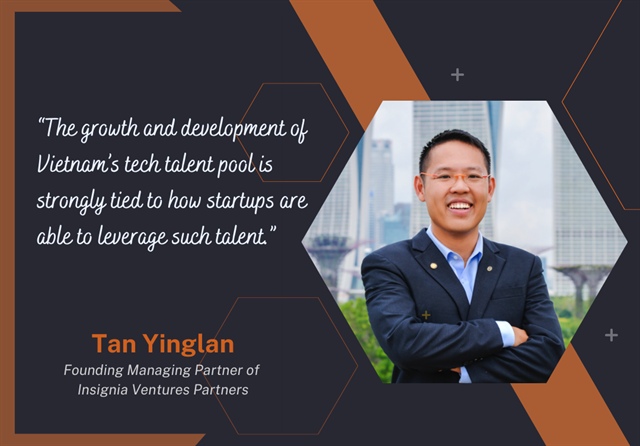[Vietnam – a hub for nurturing talents] Talents - driving force for leveraging Vietnam’s startups
[Vietnam – a hub for nurturing talents] Talents - driving force for leveraging Vietnam’s startups
Leveraging the available talent, nurturing locals, and embracing innovative strategies drive Vietnamese startups to exceptional performance.
 |
Vietnam has emerged as a promising destination for startups and ventures in recent years, thanks in large part to the country's tech talent pool.
Tan Yinglan, Founding Managing Partner of Insignia Ventures Partners, recognizes the potential of Vietnam's tech workforce and its importance in shaping the country's startup ecosystem. His early-stage venture capital firm invests in five Vietnamese startups in the education, fintech, logistics, recruitment, and healthcare sectors, of which Finhay and Medici Vietnam were listed in Forbes' Asia 100 to Watch in 2022.
He emphasized that the tech workforce landscape in Vietnam has become increasingly competitive as more global companies rethink their talent pool distribution and startups continue to emerge or expand their operations in the country.
 |
Antler, another early-stage venture capital firm based in Singapore, prioritizes evaluating startup founders' roles, visions, and capabilities as the basis for its investment decisions. The firm has funded 72 startups in the e-commerce, fintech, and logistics sectors, primarily in Singapore, Indonesia, and Vietnam. As of the first quarter of this year, Antler's portfolio companies have collectively raised an impressive US$718 million globally, resulting in a portfolio value of US$3.8 billion.
Two Singapore-based venture capital firms shared a similar perspective on talented founders. Besides, there are also over 200 other venture capital firms and more than 100 incubators showing significant interest in the flourishing startup landscape of the Southeast Asian country.
 |
The country boasts around 3,800 startups operating in various fields such as fintech, e-commerce, healthtech, and logistics. Several Vietnamese startups, including VNG, VNLife, MoMo, and Sky Mavis, have achieved impressive valuations of at least US$1 billion, according to the Ministry of Science and Technology.
Justin Nguyen, General Partner of Monk's Hill Ventures, noted that Vietnam has seen a steady increase in the number of tech-centric founders who have fostered product-centric cultures. This phenomenon has contributed significantly to the growth of companies and played a key role in establishing the country as a prominent startup and tech hub.
"The workforce here is the one to be reckoned with, and it is increasingly the case that Vietnam is where regional champions go to build their high-performing tech teams," he pointed out.
 |
The Vietnam Innovation & Tech Investment Report 2023 also highlighted that Vietnam has a young population with many tech-savvy individuals who eagerly embrace new technologies and innovations.
"This enthusiasm is fostered by Vietnam's robust STEM education system, which nurtures a pool of highly skilled tech professionals and positions the country as an emerging talent hub for the tech industry," the report said.
The Vietnamese government has implemented several initiatives to encourage and support the growth of the country's technology sector, which has attracted significant investment in recent years.
According to a report by the Ministry of Planning and Investment's Vietnam National Innovation Center (NIC) and Do Ventures, total investment in tech startups in Vietnam reached nearly $2 billion over the past two years, making the country the third largest in Southeast Asia in terms of deals and capital.
 |
Recognizing the crucial role played by their technology teams in attracting venture capital and scaling operations, manyVietnamese startups are actively seeking investment to fuel their growth.
Dat Bike, a Vietnamese electric motorbike startup, one of many investees in Vietnam that have successfully raised funding rounds due to the recognition of its talented team by venture funds, acknowledged the importance of a strong tech team in the startup's success.
Dat Bike CFO Pham Duc Nam Trung shared that in the world of tech startups, the key to success lies in focusing on product development. The tech team plays a pivotal role in determining the company's growth rate and future potential.
 |
"It is not as simple as having a brilliant idea and creating an excellent product that sells immediately. Instead, the product needs to continuously evolve to meet market demands, which requires a highly skilled tech team capable of continuous innovation," he told The Hanoi Times.
He added that investors share this perspective, recognizing that ideas are plentiful, but the ability to deliver outstanding products is what truly matters.
Last year, Dat Bike achieved remarkable growth, with revenue increasing tenfold and the number of employees tripling since the launch of the Weaver 200 product in November 2021. In addition, the number of orders exceeded expectations and goals by a factor of three.
Assessing the capabilities of a startup's tech team is critical before making investment decisions, said Nguyen Nhat Huy, COO of Telio, a Vietnam-based business-to-business (B2B) e-commerce startup.
"Startups need to do all the sorts of frugal innovations all the time, so they are highly dependent on a small team of tech human resources. The quality of these resources is critical to the growth and success of the startup, as most startups are either tech-led or tech-enabled. Therefore, every potential investor evaluates the capabilities of the tech team before investing in a startup," he added.
 |
Kelvin Vuong Minh Thuong, Group CTO at Chotot, Vietnam's online classifieds site, believed that a strong technology founding team is a make-or-break factor for any tech startup. "A strong technology founding team ensures business concepts or ideas can reach the market and end users faster. Investors will have more confidence in the team's ability to scale up during the growth phase," he pointed out.
 |
While Vietnam boasts a talented tech workforce, Kelvin Vuong acknowledged that the labor market in Vietnam is gradually becoming more expensive, adding that human resources research indicates that salaries for engineers have surpassed those in countries like Indonesia, requiring the training of more quality engineers to meet the growing demand from startups.
In this context, he suggested that startups need to adopt innovative approaches, such as recruiting and training fresh graduates, instead of relying solely on expensive pre-trained engineering resources.
"There is more demand than supply of high-quality tech talent, which is a problem not only for Vietnam but for the entire industry. The number of tech professionals entering the workforce is increasing, but we need time to groom our young workforce and allow them to gain exposure and experience," he told The Hanoi Times.
 |
Tan Yinglan of Insignia Ventures Partners said the Vietnamese government is also playing a crucial role in developing the tech talent pool, with a goal of creating 1.3 million IT jobs by 2025. However, it is important to note that the experience gained in local companies contributes significantly to shaping the quality of the tech talent pool, he stressed.
To fully reap the benefits of the talent pool, Tan Yinglan suggested that Vietnamese startups need to effectively utilize the available talent. This means seizing the opportunities presented by the talent pool to drive their growth. The growth and development of Vietnam's tech talent pool is closely linked to startups' ability to hire and nurture local talent.
He added that hiring local talent, providing them with valuable experience and insights into building a business and seeing them take these learnings back to new startups creates a virtuous cycle of talent development that positively impacts the startup ecosystem.
 |
"What will be exciting to see in the next few years is how the quality of the tech talent pool will increasingly be defined by their experience in local companies, such as the engineering talent coming from Finhay, a smart investment platform we have been investing in since 2019," he told The Hanoi Times.
According to local insiders, as the tech industry in Vietnam continues to evolve and mature, the quality of the tech talent pool will increasingly be defined by their experience in local companies. This trend highlights the importance of nurturing and retaining local talent to create a sustainable pipeline of skilled professionals who can contribute to the growth and success of Vietnam's tech sector.
 |





















